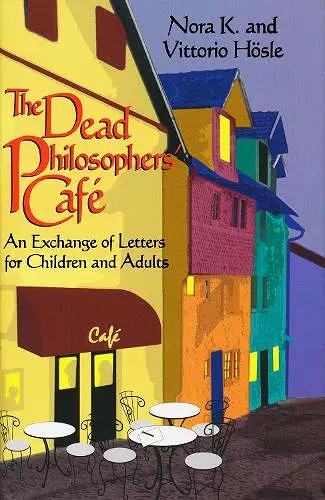Dead Philosophers' Cafe, The
An Exchange of Letters for Children and Adults
Format:Hardback
Publisher:University of Notre Dame Press
Published:20th Mar '02
Currently unavailable, and unfortunately no date known when it will be back

Eleven-year-old Nora K. received Jostein Gaarder’s Sophie’s World as a birthday present, and in it she read about Plato’s theory of ideas. One problem especially intrigued her: What about the Platonic idea of the dinosaur? Ideas are timeless and cannot die. The dinosaurs, however, became extinct ages ago. Does the idea of the dinosaur still exist all the same? Could it even be that the material world is a dream and time an illusion? Moreover, is there such a thing as free will, or is everything predetermined? Is the soul eternal? Do animals have a consciousness? Is the universe infinite? Is there such a thing as objective truth? Does God exist, and why is there evil in the world?
These are some of Nora’s questions which prompted her correspondence with Vittorio Hösle, a philosopher by profession, who invents a wonderful philosophical fantasy. Taking the film Dead Poets Society as his inspiration, he creates a place where the great philosophers of antiquity and their modern successors can all meet. They gather in the “Café of the Dead but Ever Young Philosophers” and discuss Nora’s letters—Parmenides and Socrates, Descartes and Hobbes (whom Nora doesn’t like at all), “Mac” (Machiavelli) and Kant, Nora’s “patron philosopher” Giambattista Vico and Hans Jonas, and many others. The sparks fly from time to time, as the great thinkers squabble quite frequently—no wonder, since conflicting arguments from the entire history of philosophy collide with each other head-on.
Nora’s letters are intelligent, never precocious, and always imaginative. Vittorio Hösle provides answers which are entertaining but still critical, and he is clearly concerned about not setting his expectations of the child too low. In his afterword on children’s philosophy and philosophy with children, he sketches what role philosophy could play in raising children. The correspondence with Nora, an authentic exchange of letters between January 1994 and January 1996, is a lovely document of a philosophical friendship between an adult and a child.
The Dead Philosophers’ Café has been widely translated and is now making its first appearance in the English language.
“These discussions—related to Nora through Vittorio’s letters—raise, challenge, and vigorously debate these issues in a philosophically satisfying and entertaining fashion. To its credit, this work implicitly argues that philosophical ideas and problems are not solely a playground for adults; they are equally relevant to children. It also illustrates that, by engaging the intellect and imagination in a comprehensive and constructive way, philosophy may even be fun.” —International Philosophical Quarterly
“Hösle (Univ. of Essen, Germany, and Univ. of Notre Dame, Indiana) presents two years of correspondence between himself and an 11- to 13- year-old girl identified as Nora K. Nora received a copy of Jostein Gaarder’s Sophie’s World (Eng., 1994); when Hösle first met her, she asked whether the Platonic idea of the dinosaur had ceased to exist, since there are no living dinosaurs. In a thank you note for a marzipan dinosaur present from Hösle, she mentioned that Aristotle’s conception of women made her made. Hösle responded with a letter describing the “Cafe of the Dead but Ever Young Philosophers.” where the philosophers Gaarder mentioned were encountered arguing among themselves. Nora was quick to play along with the fantasy, and 56 letters ensued. There is much of interest in the letters, but it is easy to miss the point of this book. A better beginning might have been prefaced by Nora; only late does Hösle reveal his intention: “What is new, and perhaps unique, about the present work is that it contains the philosohy of a child” rather than philosophy about children. Hösle ends with an insightful commentary but risks losing readers by failing to say earlier why and how they should attend to the exchange. Recommended; all levels.” —Choice
ISBN: 9780268008949
Dimensions: 216mm x 140mm x 14mm
Weight: 376g
176 pages